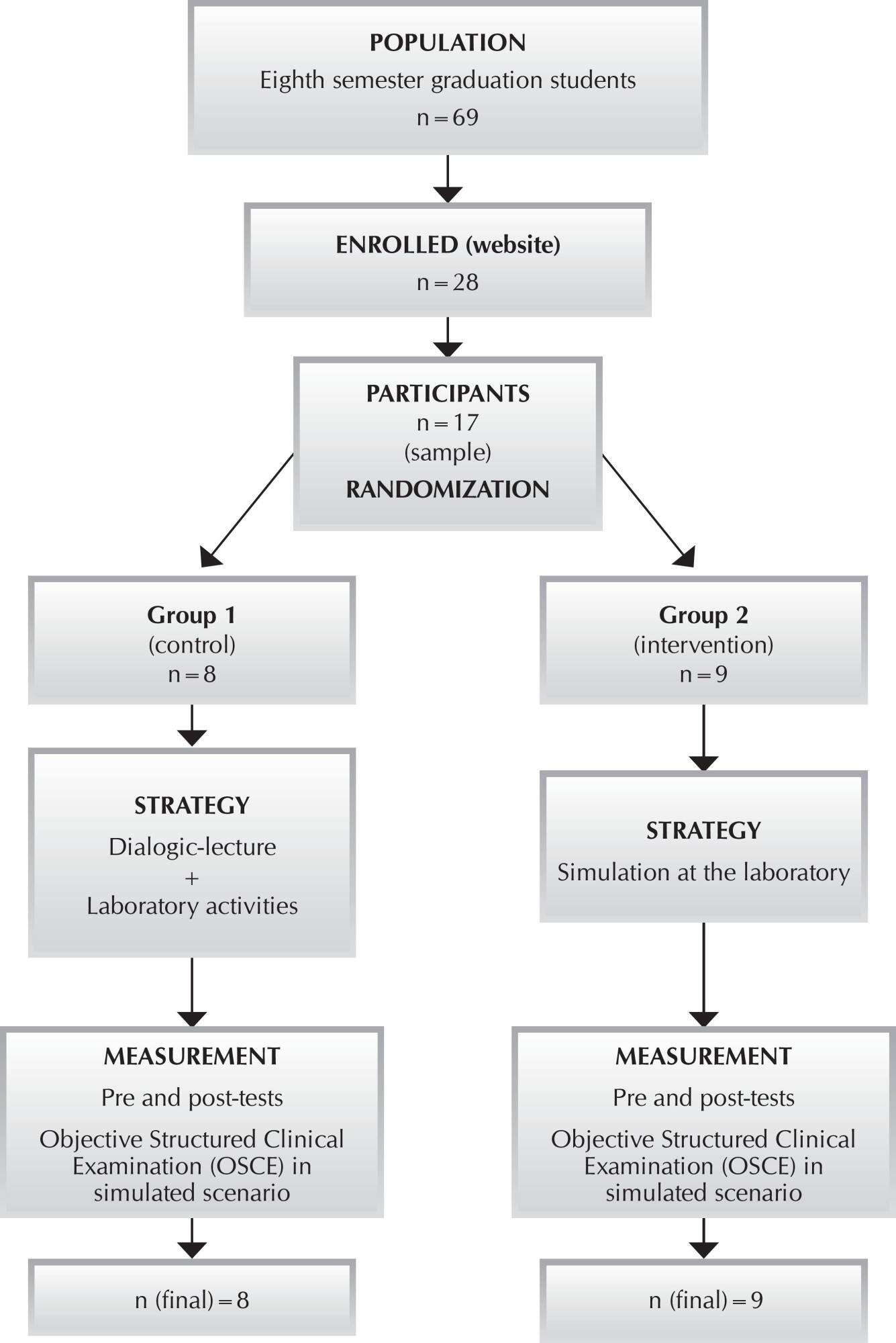-
EXPERIENCE REPORT
Clinical simulation to teach nursing care for wounded patients
Revista Brasileira de Enfermagem. 2018;71:1785-1790
01-01-2018
Abstract
EXPERIENCE REPORTClinical simulation to teach nursing care for wounded patients
Revista Brasileira de Enfermagem. 2018;71:1785-1790
01-01-2018DOI 10.1590/0034-7167-2017-0170
Views0See moreABSTRACT
Objective:
to report the experience of constructing and applicating clinical simulation scenarios for the evaluation and treatment of wounds.
Method:
experience report on two simulation scenarios for nursing care of wounded patients applied to nursing undergraduates. We structured simulations based on the model from the National League for Nursing/Jeffries Simulation Framework. The scenarios were evaluated by the instrument Simulation Design Scale and the students by the experience with the simulation.
Results:
the scenarios reproduced nursing care situations with the application of role play and moulage, which allowed us to evaluate and discuss the wound treatment. Reflections on the debriefing were important for the teaching-learning process and association between theory and practice, these factors determined the satisfaction of students with the activity.
Conclusion:
using clinical simulation scenarios to teach students favored the clinical reasoning and decision-making in the evaluation and treatment of wounds.
-
EXPERIENCE REPORT
From theory to practice, operating the clinical simulation in Nursing teaching
Revista Brasileira de Enfermagem. 2018;71:1791-1798
01-01-2018
Abstract
EXPERIENCE REPORTFrom theory to practice, operating the clinical simulation in Nursing teaching
Revista Brasileira de Enfermagem. 2018;71:1791-1798
01-01-2018DOI 10.1590/0034-7167-2017-0180
Views0See moreABSTRACT
Objective:
To report the experience of the operationalization of clinical simulation as a pedagogical strategy in a subject of an undergraduate course in Nursing.
Method:
Clinical simulation cycles were carried out following the steps of action research, such as: planning, action, observation and reflection, from March 2014 to July 2015 with 10 professors and 44 students from a Primary Care and Mental Health subject of an undergraduate course in Nursing.
Results:
Five cycles of clinical simulation were performed, at the end of each cycle modifications were suggested by students and professors and the operation was adjusted to meet the needs of the subject. The main points of change were: professor role, logistics, equipment, debriefing model and preparation of “simulated patients”.
Final considerations:
The clinical simulation is a possible method to be operationalized in undergraduate course in Nursing, needs pedagogical and logistic planning as well as, sensitization of professors and students.

-
RESEARCH
Teaching airway management with laryngeal mask: randomized controlled trial
Revista Brasileira de Enfermagem. 2016;69(2):368-374
01-01-2016
Abstract
RESEARCHTeaching airway management with laryngeal mask: randomized controlled trial
Revista Brasileira de Enfermagem. 2016;69(2):368-374
01-01-2016DOI 10.1590/0034-7167.2016690221i
Views0See moreABSTRACT
Objective:
to teach airway management with laryngeal mask to nursing students through dialogic lectures along with laboratory activities or exclusively through simulation class.
Method:
randomized controlled trial. Population: eighth semester bachelor's degree students. Sample: 17 students randomized in the intervention group (IG: simulation class) or control group (CG: dialogic lecture along with laboratory activities). Elaborated and validated instruments: written test, simulation scenario, objective structured clinical examination (checklist). Data collected from workshop. Structured clinical examination in simulation scenario filmed and evaluated by 3 experts, and written tests were applied.
Results:
24.4±4.2 years old. Right answers percentage: CG: pre-test 66±10%; post-test 84±8%. IG: pre-test 65±5%; post-test 86±11%. Scenario: CG 78±5.2%; IG 84±8.9%.
Conclusion:
strategies allowed the development of knowledge, skills and decision-making, which are essential to achieve the scenario objectives. Knowledge was incorporated in airway management with laryngeal mask, shown by the increase in the scenario and written tests scores.

-
RESEARCH
Validation to Portuguese of the Debriefing Experience Scale
Revista Brasileira de Enfermagem. 2016;69(4):705-711
01-01-2016
Abstract
RESEARCHValidation to Portuguese of the Debriefing Experience Scale
Revista Brasileira de Enfermagem. 2016;69(4):705-711
01-01-2016DOI 10.1590/0034-7167.2016690413i
Views0See moreABSTRACT
Objective:
to translate and validate to Portuguese the Debriefing Experience Scale jointly with individuals that used high-fidelity simulation in learning.
Method:
methodological and exploratory study for an instrument translation and validation. For the validation process, the event "III Workshop Brazil - Portugal: Care Delivery to Critical Patients" was created.
Results:
103 nurses attended. Validity and reliability of the scale, the correlation pattern among variables, the sampling adequacy test, and the sphericity test showed good results. Since there was no relationship among the groups established in the exploratory factor analysis, the option was to follow the division established by the original version.
Conclusion:
the version of the instrument was called Escala de Experiência com o Debriefing. The results showed good psychometric properties and a good potential for use. However, further studies will contribute to consolidate the validity of the scale and strengthen its potential use.
-
RESEARCH
Evaluation of nursing students about learning with clinical simulation
Revista Brasileira de Enfermagem. 2015;68(2):311-319
01-01-2015
Abstract
RESEARCHEvaluation of nursing students about learning with clinical simulation
Revista Brasileira de Enfermagem. 2015;68(2):311-319
01-01-2015DOI 10.1590/0034-7167.2015680218i
Views0See moreABSTRACT
Objective:
to describe the contributions of clinical simulation for learning cognitive and procedural attributes through debriefi ng, from the perspective of nursing students.
Method:
descriptive exploratory study. Twenty nursing undergraduate students from a university in the interior of the state of São Paulo participated in this study. Data collection was performed at the debriefi ng stage. Student’s perceptions about the simulation, positive aspects and what they could have done differently were registered. The students’ statements were grouped according to the central themes and the framework of Bardin’s content analysis (2011) and were analyzed using descriptive statistics.
Results:
enhancement of active, critical and refl ective learning (47.5%) was identifi ed due to the closeness to reality in nursing care (20.3%), manifestation of feelings experienced during the simulation (15.3%) and composition of the scenario (15.3%).
Conclusion:
the clinical simulation followed by debriefi ng promotes the understanding of the link between action and achievements in learning.



